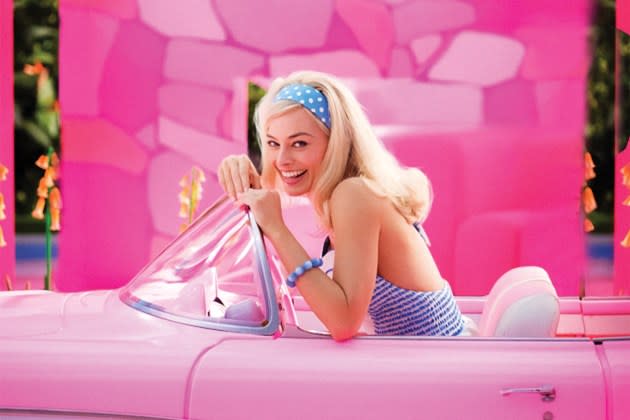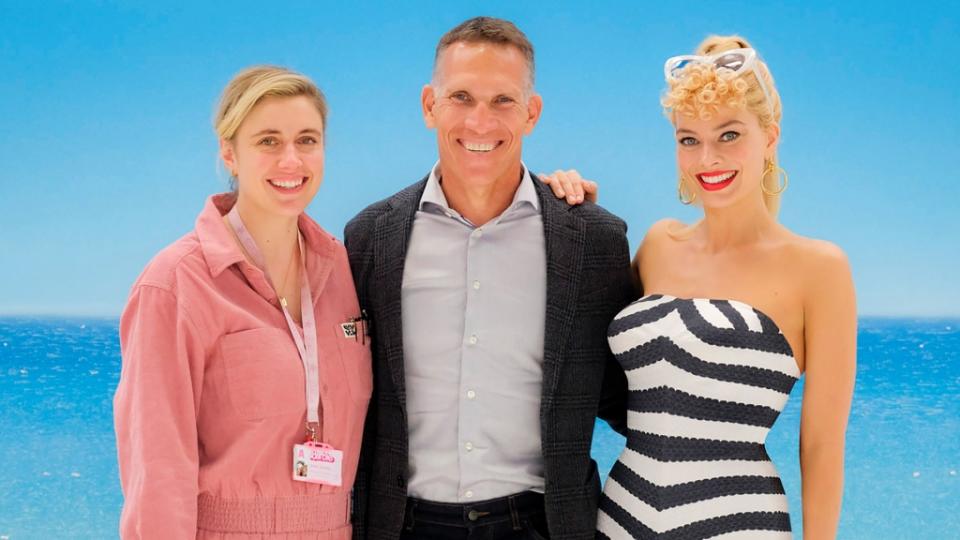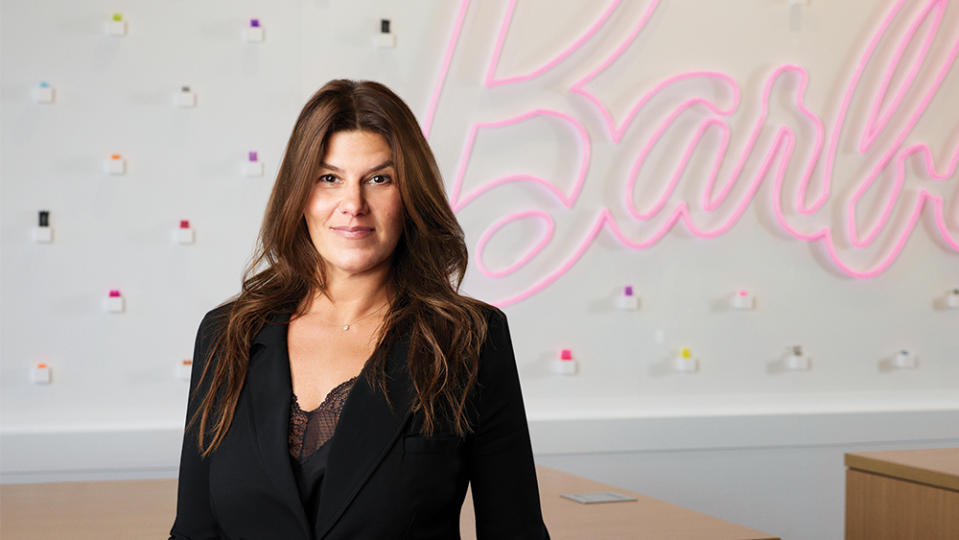‘This Is Not About Selling Toys’: Mattel Bosses on ‘Barbie’s’ Long Development, Needing a Female Director and More
- Oops!Something went wrong.Please try again later.
- Oops!Something went wrong.Please try again later.

There’s a lot riding on “Barbie.”
The much-hyped film from Greta Gerwig and Margot Robbie stands to be monumental for Mattel, turning the 78-year-old toy company into its own cinematic universe. But if the movie falls short, it could damage the American brand that has only just stabilized after a long period of turmoil.
More from Variety
A decade ago, with the rise of e-commerce and the consequent closing of toy stores, Mattel’s sales were nosediving. A cultural shift in beauty standards, gender norms and representation didn’t help the parent company of the white plastic doll. Then, in 2018, after rapidly cycling through a handful of CEOs, Mattel brought in a new boss with a big vision: Ynon Kreiz, an Israeli-born businessman and former chairman of Fox Kids Europe, wanted to turn the toy company into an IP-driven machine, complete with movies, TV shows, stage productions and theme parks. One of his first initiatives was to launch an in-house film division.
Now, Kreiz’s big-screen dream will finally be put to the test. “Barbie,” the first movie to launch from Mattel Films, hits theaters on July 21. In it, Robbie’s Barbie leaves the utopia of Barbie Land with Ken (played by Ryan Gosling) to enter the real world, where she discovers, among other things, the patriarchy.
“We could have done something that is maybe easier and take a brand that is less complicated and has less of a history to manage,” Kreiz says. “Or we could have done animation rather than live action. But we actually wanted to create something ambitious and unique. And you go basically straight to the top with our key brand.”
Early reviews have been overwhelmingly positive, with critics calling the film “perfection.” But there are no sure bets. In fact, this summer, the proven IP model has failed at the box office, with blockbusters like Disney’s “Indiana Jones and the Dial of Destiny” and DC’s “The Flash” crumbling.
But Barbie is as iconic as it gets. She’s the top-selling doll in the world. (Last year, she drove roughly one-third of Mattel’s $5.2 billion in annual revenue.) And a glitzy and expensive marketing campaign for the film has only added to her luster. #Barbiecore, the term for Barbie-inspired pink fashion, has more than 500 million views on TikTok. And who hasn’t seen the pink-painted bus stops in L.A., the double-decker buses in London, the Barbie-themed group date that aired on ABC’s “The Bachelor” and the real-life beach house in Malibu?
If the $100 million movie is a win, it not only will serve as a proof of Mattel’s potential across the entertainment industry, but also could revolutionize the company’s business model, tapping into content categories that, in some cases, Kreiz says, are actually bigger than the toy industry.
With the film tracking to open this weekend at $95 million to $110 million, it looks like Kreiz’s tinsel town vision could pay off.

Barbie’s road to the big screen has been a long one. Warner Bros. is the third studio to attempt to make a “Barbie” film with Mattel. First, in 2009, the project was set up at Universal. Then it went to Sony, where Amy Schumer was cast as the plastic icon, and then Anne Hathaway. (“Taking this skinny blond white doll and making her into a heroine was a tall order,” Diablo Cody, who worked on one of the failed scripts at Sony, said in a recent interview. In another interview, Schumer said creative differences led her to depart the project, but she expressed her excitement for Gerwig’s “feminist and cool” adaptation.)
When Kreiz took the reins of Mattel in 2018, one of his first orders of business was to regain control of the “Barbie” rights when Sony’s option expired. It was the initial step in his plan to open Mattel’s toy box and invite the town’s agents, networks and studios over for a very lucrative playdate.
Within weeks of joining the company, the CEO met with Robbie. He believed the A-lister was the ideal partner to bring the doll to life, and she was interested in producing a “Barbie” movie through her company, LuckyChap Entertainment. In Kreiz’s mind, without Robbie there was no “Barbie.”
“It was Margot,” Kreiz says. “There was no other option.”
The storyline for a film about Barbie was not obvious — that is, until Robbie suggested Gerwig as a writer-director.
“Before the idea of Greta came up, we went out to a bunch of writers just to hear different ideas, and we heard a bunch of pitches,” says Robbie Brenner, the Oscar-nominated indie producer of “Dallas Buyers Club” who was hired to run Mattel Films. “Some were interesting and different and outside of the box and weird and what you would expect and terrible. I mean, the whole gamut. But there was nothing that ever felt like it was worth making a movie about until this idea of Greta directing the movie.”
Brenner says that Mattel made a commitment to put filmmakers first — ahead of toys — and that’s what will keep top-tier talent like Robbie and Gerwig coming its way. “Telling good stories is telling good stories,” she says, “no matter if you’re making independent movies or huge $100 million movies. It’s all about the script, story, cast and the filmmakers — it’s just doing it on a bigger scale.”
When asked if “Barbie” could have been helmed by a man, Brenner says, “I think we felt pretty strongly that it needed to be told from a woman’s point of view. Not to say that a man can’t do it. But I think for ‘Barbie,’ this is the ultimate female-empowerment movie. It’s in the DNA of the movie. I think we all felt like it should be a female.”

Gerwig wanted to write the script with her partner, Noah Baumbach. And even though the movie is based on one of Mattel’s most-prized products, Brenner and Kreiz say they were committed to not meddling with what the filmmakers were doing. “It’s not about oversight. It’s not about control. It’s about trust and how we work with creators,” Kreiz says.
“The risk was that people outside of Mattel would think that we want to make movies in order to sell more toys,” he adds, thinking back to his first conversation with Robbie. “And I was very clear that this is not about selling toys. This is about creating quality content, creating an experience with societal impact that people would want to watch. We’ve been selling toys before we made movies, so we’re not dependent on that.”
Still, when Gerwig’s initial script came in, eyebrows were raised inside Mattel.
“When everybody read the script here for the first time, I’m sure there were things that were like, ‘Wow, that sort of pushes things a little bit,’” Brenner says. “But we all decided there were going to be moments where it might feel a little scary, but we’re going to be rewarded for that. Being safe in this world doesn’t work. We want it to be bold. Barbie is bold. She’s done incredible things. She’s a trailblazer. And that’s what we did.”
“I will say,” Brenner adds, “The first script I read that Greta and Noah wrote is very similar to the movie that actually is on the screen.”
Indeed, the movie doesn’t shy away from criticism of the company. One character, played by Will Ferrell, is a Mattel CEO who represents corporate America. Kreiz laughs when he talks about being portrayed by the actor. “I’m a big fan of Will, ever since the ‘Zoolander’ days,” he says. “There are so many elements of humor and self-deprecation in the movie. And we embrace that. We take our brands very seriously. We take what we do very seriously. But we don’t take ourselves
too seriously.”
No matter how many times Mattel executives say they’re not making films to sell toys, they do have to sell toys. The hope is that with the birth of the movie division, Mattel’s products and films will amplify each other, so the entire business skyrockets. It’s a proven model: Hasbro kicked off the toy blockbuster trend in 2007 when it turned its Transformers toys into a multibillion-dollar film franchise with Paramount. And Warner Bros.’ 2014 “The Lego Movie” made more than $450 million and spawned two sequels.
The plan is already working. Ahead of the release of “Barbie,” Mattel has put out a line of movie-specific dolls inspired by Robbie, Gosling, Issa Rae, America Ferrera and Simu Liu’s characters. Robbie’s Barbie instantly became the top-selling doll on Amazon.
The company has dozens of films in the works — 14 projects are in active development or pre-production with big names like J.J. Abrams (“Hot Wheels”), Lena Dunham (“Polly Pocket”), Vin Diesel (“Rock ’Em Sock ’Em Robots”) and Tom Hanks (“Major Matt Mason”) — but Brenner and Kreiz aren’t sure which will go into production next. This week, Variety reported that Mattel is shopping for a new buyer for “Masters of the Universe,” after Netflix dropped the film that is based on beloved characters like the superhero He-Man, that had been in development at the streamer. For now, Mattel is focused on making “Barbie” a success.
“‘Barbie’ is a showcase for how we work with creative people, but also whether our brands can translate to success on-screen. Because that can also be debated,” Kreiz says. “Not every toy can become a successful movie.”
Best of Variety
Sign up for Variety’s Newsletter. For the latest news, follow us on Facebook, Twitter, and Instagram.

